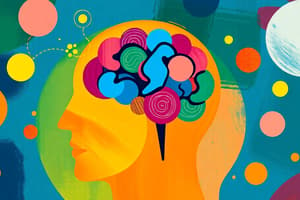Podcast
Questions and Answers
What does social desirability refer to?
What does social desirability refer to?
- Tendency of participants to answer negatively
- Tendency of participants to skip questions
- Tendency of participants to answer honestly
- Tendency of participants to answer to appear good (correct)
Standardized tests include intelligence tests and personality tests.
Standardized tests include intelligence tests and personality tests.
True (A)
What is a major disadvantage of standardized tests?
What is a major disadvantage of standardized tests?
provide information about individual differences among people
The main objective of a case study is to obtain a case ______ of the person being studied.
The main objective of a case study is to obtain a case ______ of the person being studied.
Match the following indigenous research methods with their descriptions:
Match the following indigenous research methods with their descriptions:
What does the word 'psychology' come from?
What does the word 'psychology' come from?
Psychology is the study of behavior and mental processes.
Psychology is the study of behavior and mental processes.
Who is considered the father of psychology?
Who is considered the father of psychology?
Clinical psychology deals with the diagnosis and treatment of _____ problems.
Clinical psychology deals with the diagnosis and treatment of _____ problems.
Match the following psychology specializations with their descriptions:
Match the following psychology specializations with their descriptions:
Who was the first Filipino to major in Psychology from the undergraduate to the doctoral level?
Who was the first Filipino to major in Psychology from the undergraduate to the doctoral level?
The Psychodynamic approach was developed by Carl Jung.
The Psychodynamic approach was developed by Carl Jung.
Who is considered the father of behaviorism?
Who is considered the father of behaviorism?
The __________ approach focuses on the subjective or personal experience of events.
The __________ approach focuses on the subjective or personal experience of events.
Match the following research methods with their descriptions:
Match the following research methods with their descriptions:
Flashcards are hidden until you start studying
Study Notes
Definition of Psychology
- Psychology is the study of behavior and mental processes
- It is an objective and systematic study of how people think and behave
- The goal of psychology is to understand behavior and mental processes
Fields of Psychology
- Clinical Psychology: deals with the diagnosis and treatment of emotional and behavioral problems
- Counseling Psychology: concerned with personal issues such as academic, social, or vocational problems
- Industrial-Organizational Psychology: deals with the application of psychological principles and research methods in the workplace
- Developmental Psychology: involves the study of physiological, cognitive, and social development
- Social Psychology: focuses on how people think, influence, and relate with one another
- Experimental Psychology: employs the behavioral and cognitive perspectives, as well as the experimental method
- School and Educational Psychology: deals with the evaluation of learning and emotional problems of individuals in schools
Historical Roots of Psychology
- The debate over the nature versus nurture debate persists
- Wilhelm Wundt, known as the father of psychology, founded psychology as an academic discipline in 1879
- Granville Stanley Hall, who studied with Wundt, established the first psychology laboratory in the US
- James McKeen Cattell, another Wundt student, became the first psychology professor in the US
Perspectives in Psychology
- Psychodynamic Approach: developed by Sigmund Freud, focuses on unconscious processes, conflict between biological instincts and society's demands, and early family experiences
- Behavioral Approach: only studies what people do, and does not consider the individual's mental processes
- Cognitive Approach: concerned with mental processes, such as perceiving, remembering, reasoning, and problem-solving
- Biological or Behavioral Neuroscience Approach: studies how the brain and nervous system underlie behavior and mental processes
- Phenomenological or Humanistic Approach: focuses on the subjective or personal experience of events and the need for personal growth
- Sociocultural Approach: studies the ways by which social and cultural environments influence behavior
- Evolutionary Psychology Approach: emphasizes the importance of adaptation, reproduction, and survival of the fittest in explaining behavior
Research Methods
- Experimental Method: aims to discover the effect of an independent variable on a dependent variable
Importance of Studying Psychology
-
Psychology is crucial in understanding human behavior and mental processes
-
It helps in developing interventions to improve mental health and well-being
-
Study of psychology is essential in various fields, such as education, healthcare, and industry### Research Methods in Psychology
-
There are 8 research methods in psychology: experimental, quasi-experimental, correlational, naturalistic observation, survey, standardized tests, case studies, and archival research.
Experimental Method
- The variable manipulated is called the independent variable (IV).
- The variable being measured is called the dependent variable (DV).
- Extraneous variables that may influence the DV should be controlled by eliminating them or keeping them constant.
- An experiment uses a design, which refers to the plan and structure of the study.
- Measurement involves assigning numbers to objects or events according to rules.
Quasi-Experimental Method
- It is similar to the experimental method except that random assignment of participants is not possible.
- The IV is already inherent in the participants, and manipulation of the IV is unethical.
- Different quasi-experimental designs include ex post facto, where preexisting differences are employed as the basis of forming the different groups in the study.
- The advantage of the quasi-experiment is that it allows us to study variables that cannot be manipulated by the experimenter.
Correlational Method
- The objective is to determine whether two or more variables are associated or related to each other.
- The variables are first measured, after which a correlational analysis or technique (e.g., Pearson r) is conducted to determine the relationship.
- The range of the correlation coefficient or r is between 0 (no relationship) and +/-1 (perfect relationship).
- The sign of r indicates whether a relationship is positive/direct or negative/indirect.
Naturalistic Observation Method
- It involves observing the phenomenon of interest as it occurs naturally.
- The observation of both animal and human behavior may serve as a starting point for more research in psychology.
- Advantages include realism (high external validity) and descriptive information on the sequence and development of behaviors.
- Disadvantages include perceptual distortion, lack of control over the situation, and difficulties in quantification of data.
Survey Method
- It uses either a written questionnaire or an interview schedule to gather data about experiences, feelings, thoughts, and motives that are hard to observe directly.
- Important considerations include the instrument and the sampling design.
- Written questionnaires have advantages such as being easier to administer, economical, and ensuring the anonymity of respondents.
- Face-to-face interviews are more expensive and susceptible to interviewer bias but allow for clarifications.
- Sampling is essential, and errors may lead to inaccurate conclusions.
- A major disadvantage is that respondents may not answer honestly, and there is always the possibility of social desirability.
Standardized Tests
- This method requires respondents to answer a series of questions, and their responses are scored to reflect something about their persons.
- A respondent's score is compared with those of others who took the same test.
- Examples of standardized tests include intelligence tests and personality tests.
- A major disadvantage is that they provide information about individual differences among people.
- Many standardized tests must undergo rigorous reliability and validity testing, and may not be appropriate for other cultures.
Case Studies
- It is a descriptive record of an individual's experiences or behavior, or both, as kept by an observer.
- The main objective is to obtain a case history of the person being studied.
- Other research methods may be used to collect data for a case study, such as interviews, tests, and observations.
- Case studies are usually used for clinical purposes, such as diagnosis, but can also be used to study groups of individuals and organizations.
- Advantages include gaining insight into a person's experiences and behaviors in great detail.
- Disadvantages include the potential for distortions of events or oversights, and the results cannot be generalized across other individuals.
Archival Research Method
- Written records, statistical archives, and physical traces of human beings are systematically studied in lieu of actual behaviors.
- Examples of materials that can be analyzed include diaries, letters, paintings, books, poems, newspaper or magazine articles, movies, and speeches.
- A systematic observation of these materials reveals patterns of behavior.
- Advantages include allowing hypothesis testing over a wider range of time and societies.
- Disadvantages include the availability of data, and the potential for cultural bias in western research strategies.
Indigenous Research Methods
- Some Filipino psychologists believe that western research strategies may not be appropriate to truly understand Filipino behavior.
- Topics chosen for research should emanate from among the respondents themselves.
- Methods such as pagmamasid (looking around), pakikiramdam (sensing, feeling what is happening), and pakikisangkot (deep involvement in the respondents' activities) are suggested.
- The Iskala ng Mananaliksik includes research methods ranging from the unobtrusive to the research-participative.
- The Iskala ng Pagtutunguhan ng Mananaliksik at Kalahok is based on the Filipino view of equality between the researcher and the respondents.
- Other indigenous research methods include pakikipagkwentuhan (storytelling), pakikisama (frequent interaction with the respondents), and pakikipanuluyan (residing in the research setting).
Studying That Suits You
Use AI to generate personalized quizzes and flashcards to suit your learning preferences.



